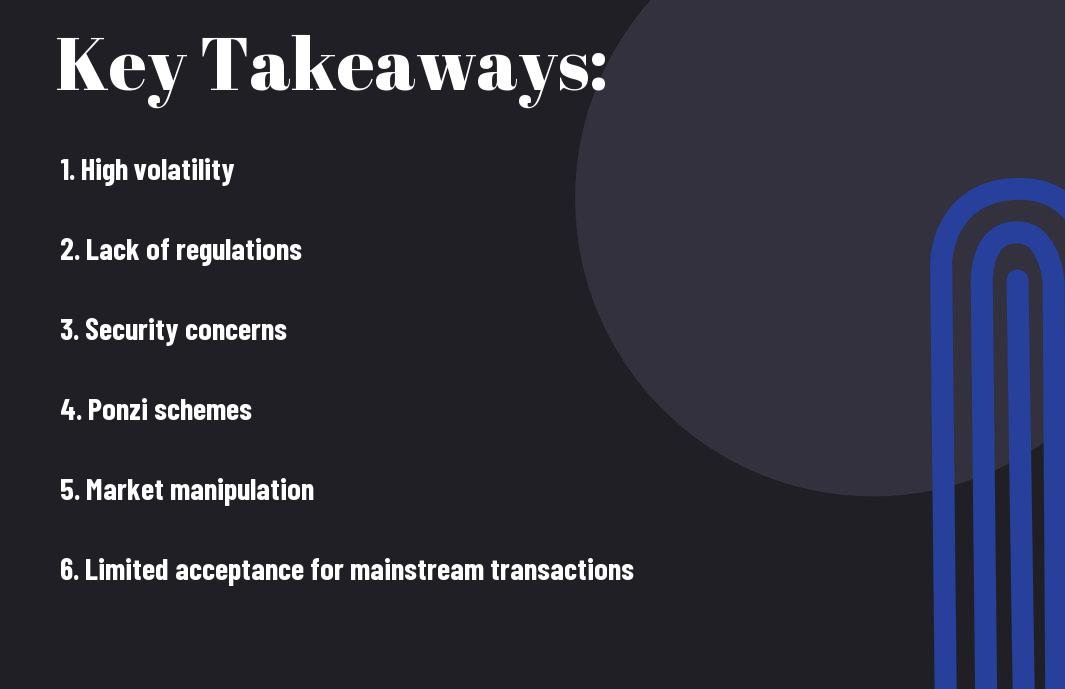As you venture into the world of cryptocurrencies, it’s vital to acknowledge that the allure of potential profits comes with a caveat: risk. You’ve likely heard the success stories of those who struck gold with Bitcoin or Ethereum, but what about the others who lost their shirts? The truth is, investing in cryptocurrencies is a high-stakes game, and it’s crucial you understand the perils that lurk beneath the surface. In this post, we’ll research into the risks that could jeopardize your investment, so you can make informed decisions and avoid costly mistakes.
Key Takeaways:
- Volatility: Cryptocurrency markets are known for their extreme price fluctuations, which can result in significant losses if you buy at the wrong time or don’t have a long-term strategy. Even popular cryptocurrencies like Bitcoin and Ethereum can experience sudden and drastic price drops.
- Lack of Regulation: The cryptocurrency market is largely unregulated, which means that investors may not have the same level of protection as they would with traditional investments. This lack of oversight can make it easier for fraudulent activities to occur, putting your investment at risk.
- Security Risks: Cryptocurrencies are stored in digital wallets, which can be vulnerable to hacking and cyber attacks. If your wallet is compromised, you could lose access to your funds. Additionally, the decentralized nature of cryptocurrencies means that there is no central authority to turn to if something goes wrong.
Market Volatility Risks
While investing in cryptocurrencies can be an exciting opportunity, it’s important to understand the market volatility risks that come with it. Cryptocurrency markets are known for their unpredictability, and prices can fluctuate rapidly, leaving you with significant losses if you’re not careful.
Price Fluctuations
With prices changing rapidly, you may find yourself buying high and selling low, resulting in substantial losses. This volatility can be attributed to various factors, including supply and demand, government regulations, and global economic conditions.
Liquidity Issues
To make matters worse, cryptocurrency markets often lack liquidity, making it difficult for you to quickly sell your assets when needed.
A lack of liquidity can lead to significant price slippage, where you’re forced to sell your assets at a lower price than expected, resulting in further losses. This is particularly concerning during times of high market stress, when you may need to quickly liquidate your assets to minimize losses.


Security Risks
Assuming you’re considering investing in cryptocurrencies, it’s crucial to understand the security risks involved. As with any digital asset, cryptocurrencies are vulnerable to various security threats that can result in significant financial losses.
Hacking and Cyber Attacks
Any cryptocurrency exchange or wallet you use can be hacked, compromising your sensitive information and funds. Cybercriminals often employ sophisticated tactics, such as phishing scams, malware, and DDoS attacks, to gain unauthorized access to your accounts.
Wallet Security Breaches
Your wallet is the primary storage for your cryptocurrency holdings, making it a prime target for hackers. Wallet security breaches can occur due to weak passwords, outdated software, or vulnerabilities in the wallet’s architecture.
Security experts recommend using cold storage wallets, which are offline and less susceptible to hacking. Additionally, enabling two-factor authentication, using strong passwords, and regularly updating your wallet software can help minimize the risk of a security breach. However, even with these precautions, there is still a risk of your wallet being compromised, and you could lose access to your funds.
Regulatory Risks
After exploring into the world of cryptocurrency investing, you may think you’ve got a handle on the market trends and volatility. However, there’s another critical aspect to consider: regulatory risks. As the cryptocurrency landscape continues to evolve, governments and regulatory bodies are still figuring out how to navigate this new territory.
Lack of Clear Regulations
One of the most significant regulatory risks you face as a cryptocurrency investor is the lack of clear regulations. Currently, there is no unified global framework for governing cryptocurrencies, leaving you vulnerable to unclear or changing rules.
Potential for Government Intervention
Lack of regulatory clarity can lead to another risk: the potential for government intervention. As governments begin to take a closer look at cryptocurrencies, they may impose stricter regulations or even bans, which could negatively impact your investments.
For instance, China’s ban on initial coin offerings (ICOs) in 2017 sent shockwaves through the cryptocurrency market, causing prices to plummet. Similarly, if a government were to impose strict regulations on cryptocurrency exchanges or wallets, it could limit your access to your investments or even freeze your assets. As an investor, it’s imperative to stay informed about regulatory developments and be prepared for potential government intervention.
Operational Risks
Keep in mind that investing in cryptocurrencies also comes with operational risks that can impact your investment. As outlined in What Are Risks of Trading Cryptocurrencies, these risks can be just as devastating as market volatility.
Technical Glitches and Outages
Technological issues can bring cryptocurrency exchanges to a grinding halt, preventing you from accessing your funds or making trades. This can be particularly problematic during periods of high market volatility, when every minute counts.
Insufficient Customer Support
For many cryptocurrency exchanges, customer support is often inadequate, leaving you to fend for yourself in the event of an issue.
A lack of robust customer support can be a major concern, especially when you’re dealing with complex technical issues or disputes over transactions. Without reliable support, you may find yourself stuck in limbo, unable to resolve problems or access your funds. This can lead to significant financial losses and a great deal of frustration.
Conclusion
To wrap up, investing in cryptocurrencies can be a thrilling venture, but it’s necessary to acknowledge the risks involved. You’ve learned about the volatility of the market, the lack of regulation, and the potential for fraud. As you consider exploring into the world of cryptocurrencies, remember that your investment can fluctuate rapidly, and there’s always a chance you might lose some or all of your money. Be cautious, do your research, and never invest more than you can afford to lose.


Hi there,
Thank you for sharing such an insightful post on the risks of investing in cryptocurrencies. It’s great to see a balanced perspective on this topic, especially when there’s so much hype around crypto investments.
One point that particularly stood out to me was the discussion on market volatility. The extreme price swings can indeed be both thrilling and nerve-wracking for investors. I’ve noticed that some people treat it almost like a gamble rather than a strategic investment. What strategies do you think are most effective for managing this volatility, especially for new investors?
Additionally, I’m curious about your thoughts on the regulatory landscape. As governments around the world continue to pay increasingly more attention to cryptocurrencies, do you think stricter regulations will help mitigate some of these risks, or could they potentially stifle innovation?
Looking forward to hearing your insights.
Thank you for your thoughtful comment, Rachel! I’m glad you found the post insightful.
Market volatility is indeed one of the most challenging aspects of investing in cryptocurrencies. For new investors, some effective strategies to manage this volatility include:
1. **Diversification:** Spread investments across various assets to minimize risk.
2. **Dollar-Cost Averaging (DCA):** Invest a fixed amount regularly, regardless of the market’s state, to reduce the impact of volatility.
3. **Research and Education:** Stay informed about the projects you’re investing in and the overall market trends.
4. **Risk Management:** Only invest what you can afford to lose and set clear stop-loss orders.
Regarding the regulatory landscape, stricter regulations could indeed help mitigate some of the risks associated with cryptocurrencies, such as fraud and market manipulation. However, it’s a delicate balance. Over-regulation might stifle innovation and limit the potential benefits of blockchain technology. Ideally, regulations should aim to protect investors while fostering a healthy environment for innovation.
Looking forward to more discussions on this topic!
#Cryptocurrency #Investing #MarketVolatility #Regulations #CryptoInvesting #RiskManagement
Best regards,
Gary S